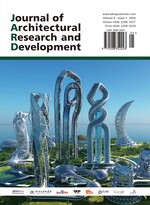Abstract
The environmental impact issues, such as global warming and expansion of the urban zone, seem more serious and have become the biggest defining challenges of the 21st century. Climate change can lead to water shortages, desertification, land degradation, air pollution, rising sea levels, accelerated deforestation, and exacerbated economic pressures. Global urban growth greatly impacts changes in sociability, humanity, and the environment of the Earth. The human presence, especially in cities, seriously affects resource use and waste disposal, and they are consuming natural resources faster than the planet can sustain during urbanization, changing how people live. China, with a population of 1.3 billion, has seen tens of millions of people living in the countryside migrate to cities, especially megacities, since the 1980s. As a result of its decision to industrialize and urbanize to boost the economy, China has become the world’s second-largest consumer of energy. In recent years, China’s government has quickly recognized the lessons of “limits to growth” and has taken action by initiating the construction process in Dongtan, Shanghai, China. They are making efforts to build urban-rural integration communities to promote sustainable development. Based on a literature review focusing on Dongtan, research questions are raised according to the research objective: (1) What are the challenges of sustainable development in urban-rural integration? (2) What practices has Dongtan implemented for sustainable development, or how is sustainable development being applied to Dongtan? (3) What are the social, political, environmental, and economic concerns regarding the sustainable development of Dongtan? The sustainable urban-rural integration concerns the ecological, economic, environmental, and psychological aspects of urban-rural integration design and management. The overall objective is to promote sustainable development in economic, social, ecological, and spatial dimensions. It will be a liveable, complete community that makes economic, environmental, and social sense locally while also contributing to national and global sustainable development. It will serve as a compelling model for how to build sustainable urban-rural integration worldwide.
References
Price C, 1997, Sustainable Development and Health: Concepts, Principles and Framework for Action or European Cities and Towns. European Sustainable Development and Health Series, No 1. Published by the WHO Regional Office for Europe.
Ranhagen U, 2002, The Sustainable City, A Vision of the Swedish-Chinese Partnership in a Global Context. Swedish Ministry for Foreign Affairs Swedish Ministry of the Environment, State Environmental Protection Administration (SEPA) of the People’s, Republic of China, Swedish Environmental Technology Network (swedentech), Swedish Trade Council
Saman W, 2007, Sustainable Cities Initiative—The Vision to Develop Integrated and Sustainable Solutions for Addressing the Critical Environmental, Economic, and Social Issues Facing Australian Cities. Institute for Sustainable Systems and Technologies, University of South Australia.
Yau RMH, Chan AKC, 2007, Towards Delivering A Sustainable Dongtan, Dongtan–21st Sustainable City. Ove Arup & Partners Hong Kong Limited.
McGray D, 2007, Pop-Up Cities: China Builds a Bright Green Metropolis. Wired Magazine, 2007(15): 05. https://www.wired.com/2007/04/feat-popup/
DODGE Construction Network, 2007, Connecting Decision Makers Throughout the Project Lifestyle. http://www.construction .com/events/BeijingSummit/presentation/DongShanFeng
Girardet H, Head P, 2006, City of the Future: Is Dongtan a New Urban Development Paradigm? Published October 27, 2006. http://www.81835.com/index.asp
Quigg S, 2003, Dongtan Eco-City © Arup F0.13, Rev 9.2.
